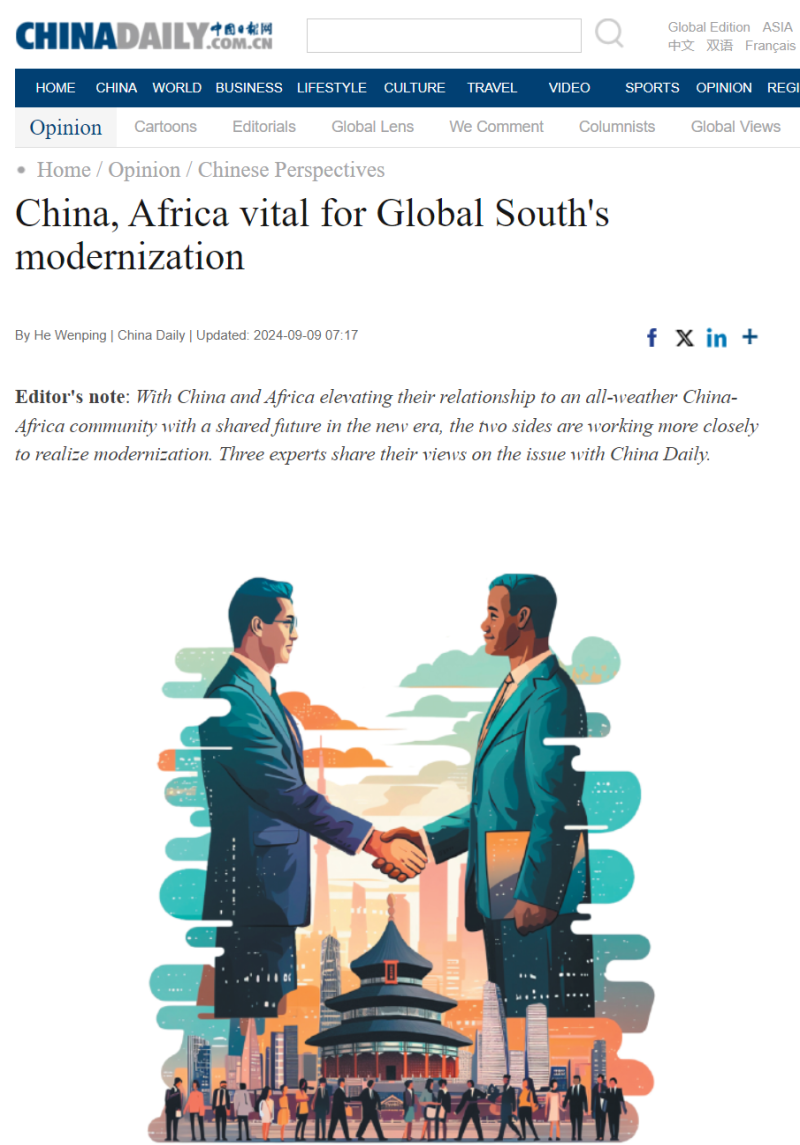He Wenping: China, Africa vital for Global South's modernization
The Forum on China-Africa Cooperation Summit, which concluded in Beijing on Friday, saw Chinese and African leaders discuss post-pandemic cooperation and ways to advance modernization.
Eradicating poverty and realizing modernization are the common goals of all Global South countries, including China and African countries. Unlike Western countries that accumulated huge amounts of capital and achieved modernization through wars and colonial exploitation, Chinese modernization is characterized by its massive scale, coordination of materials, pursuit of peaceful development and common prosperity, and establishment of a harmonious relationship between humans and nature.
China and African countries have suffered the evil consequences of Western colonialism and invasions, and face significant challenges in their quest for development and national rejuvenation. Many developing countries face some daunting development questions: Can countries once colonized achieve modernization? Does modernization equate to Westernization?
However, over the past more than 40 years, China has lifted about 800 million people out of poverty, become the world's second-largest economy, and advanced Chinese modernization, expanding the path for developing countries to achieve modernization, and proving that "modernization does not equate to Westernization".
China's pursuit of high-quality development and modernization has inspired many Global South countries, including African nations, to take measures to boost development and alleviate poverty. African countries have gained confidence that they can achieve development and modernization also from President Xi Jinping's statements that China is willing to be a partner of Africa on its path to modernization, and supports Africa to enhance its status on the global stage.
In his speech at the FOCAC Summit on Thursday, President Xi said that to promote the implementation of the 10 action plans, the Chinese government is willing to provide a total of 360 billion yuan ($50.82 billion) in funding support over the next three years, including 210 billion yuan in credit lines, 80 billion yuan in various forms of assistance. It is also willing to encourage Chinese enterprises to invest no less than 70 billion yuan in Africa.
The 10 action plans will promote cooperation in the fields of cultural exchanges, trade, digital economy, agriculture, green projects and security.
African countries support China's initiatives including the Belt and Road Initiative, the Global Development Initiative, the Global Security Initiative, and the Global Civilization Initiative as well as the FOCAC mechanism, and are willing to strengthen their partnerships to pursue co-development.
African countries have enjoyed the fruitful results of participating in the Belt and Road Initiative for the past 10 years. The initiative has also helped China and the African countries to deepen their economic and trade cooperation, and increase their trade volumes. According to official data, the China-Africa goods trade volume in 2023 reached $282.1 billion, up 10.9 percent year-on-year, with China's exports to Africa reaching $164.49 billion and imports from Africa hitting $117.51 billion, both historic highs.
Besides, China has signed Belt and Road cooperation memorandums of understanding with 52 African countries, as well as the African Union. Over the past decade, 10,000 kilometers of standard gauge railways, 100,000 kilometers of highways, 100 newly built or renovated ports, and numerous schools and hospitals have been put into operation in Africa. These successful projects show China always fulfills its commitment as a mutually beneficial partner of Africa.
Fearing that deepening China-Africa cooperation will narrow the scope for Western countries to interfere in the internal affairs of African countries, some Western politicians and media outlets have been accusing China of setting a "debt trap" for African countries by partnering them in their quest for development and investing in Africa. These Western politicians and media conveniently ignore the fact that the participation of African countries in the Belt and Road Initiative has boosted their economic development and created tens of thousands new jobs.
China's investment and financing cooperation with Africa is not a "debt trap" but a "development pie". And after the just-concluded FOCAC Summit, the pie will only grow bigger and better.
About the author:
He Wenping, a researcher with China-Africa Institute, and the Institute of West Asian and African Studies at the Chinese Academy of Social Sciences.



